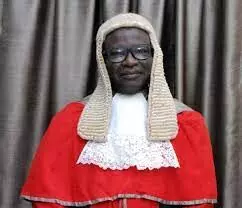Don’t allow the public loose faith in the judiciary - Justice Ajileye

A retired High Court judge, Justice Alaba Omolaye-Ajileye, called on the bar and bench not to allow the public to loose faith in the judiciary.
Speaking at the 9th Annual Week of the Badagry branch of the Nigerian Bar Association (NBA) in Lokoja, Justice Omolaye-Ajileye said, "Gentlemen of the Bar, whether we accept it or not, the truth remains that the public is watching what is going on in our courts and regularly and deeply questioning the rationale behind certain decisions, and rightly so.
“Not only will this erode public trust and confidence in the judiciary, it will also make a mockery of the hallowed principles of the rule of law on which the judiciary and the dispensation of justice as a whole rest.”
“If there was ever a period where we expected the public to blindly trust the judiciary, it is long gone. The trust necessary for the public to accept judicial decisions and court orders is fundamental to the rule of law.
“The Judiciary must continually ask itself: how and why did it allow things to degenerate to this level? This is because the Nigerian judiciary has undoubtedly enjoyed high levels of trust in the past.
“The judiciary must take this decline in public trust seriously. It cannot afford to be complacent. It is dangerous for it to assume that trust is ever-present. It must address this trust deficit.
“The public should and must be able to trust in the individual judges and the judiciary as an institution that wields immense power on its behalf.
“As Alexander Hamilton famously said, unlike the executive and legislature, the judiciary “
‘has no influence over either the sword or the purse’ and'may truly be said to have neither force nor will, but merely judgement'.
“Armed with only the power of judgement, the judiciary requires the legitimacy gained from public trust to function effectively to make the rule of law blossom," he said.
The judge noted that the general acceptance of judicial decisions by citizens and by governments "is essential for peace, welfare, good government, and the rule of law.”
He added, “The corollary is also true. To distrust the judiciary is a ready recipe for anarchy. This is because citizens who trust the judiciary are more likely to engage with the legal system to address their legal issues and to co-operate with its processes.
Justice Omolaye-Ajileye, who is currently with Baze University, Abuja, also commented on the controversy surrounding the composition of the apex court’s presidential appeal court panel.
He said: “Still on the issue of trust, His Lordship, Hon. Justice Dattijo Muhammad, JSC (Rtd), recently made a statement at his valedictory that raises a jurisprudential question on securing public trust and justice.
“I quote Him: ‘To ensure justice and transparency in presidential appeals from the lower court, all geopolitical zones are required to participate in the hearing. It is, therefore, dangerous for democracy and equity for two entire regions to be left out of the decisions that will affect the generality of Nigerians’.
“The grouse of His Lordship here is that both the North Central and South East geopolitical zones were not represented in the panel of Justices of the Supreme Court that decided appeals that arose from the Presidential Election Tribunal to the apex court recently. This he describes as ‘dangerous for democracy and equity’
“While the focus of His Lordship was on the absence of Justices from the North Central and South East geo-political zones in the panel, it was easy for social media commentators to quickly draw attention to the fact that the South West geo-political zone that parades the Chief Justice of Nigeria and two other eminent Justices of the Supreme Court was also not represented in the panel.
“According to the commentators, it was also in order to ensure ‘transparency and equity. The issue is neither here nor there.
“My humble position here is that it is better that the judiciary, including the Supreme Court, be perceived as a homogeneous entity that serves the interests of all. It is dangerous for society to perceive justice through the prisms of tribes, religions, or geopolitical divisions.
“Justice ought to remain an integral whole that does not admit of partition along tribal or geopolitical bifurcation. It is also more dangerous if the impartiality of the Supreme Court is to wait for people to see the extent to which they have been represented by justices who come from their geopolitical zones.
“Secondly, with due respect, to perceive justice from geopolitical lines is to trivialise justice. Justice is far more important than that. If we accept the intrinsic worth of every human being, then justice becomes the minimum debt we owe to him, for if we deny him justice, we have declared him worthless.
“The dispenser of justice should, therefore, be a person who is even-handed, blind to all social distinctions and disparities in wealth, religion, tribe, and status, and no respecter of persons, just as justice itself should be.
“If a nation cannot look at their judges and see men and women who are upright enough to uphold the principle of the rule of law and do justice to all manner of people without fear, favour, affection, or ill-will, then I will simply say that nation has lost it!”
The News Agency of Nigeria (NAN) reports that retired Justice Omolaye-Ajileye was noted for his high sense of honesty, integrity, and hard work during the period he spent on the bench.



